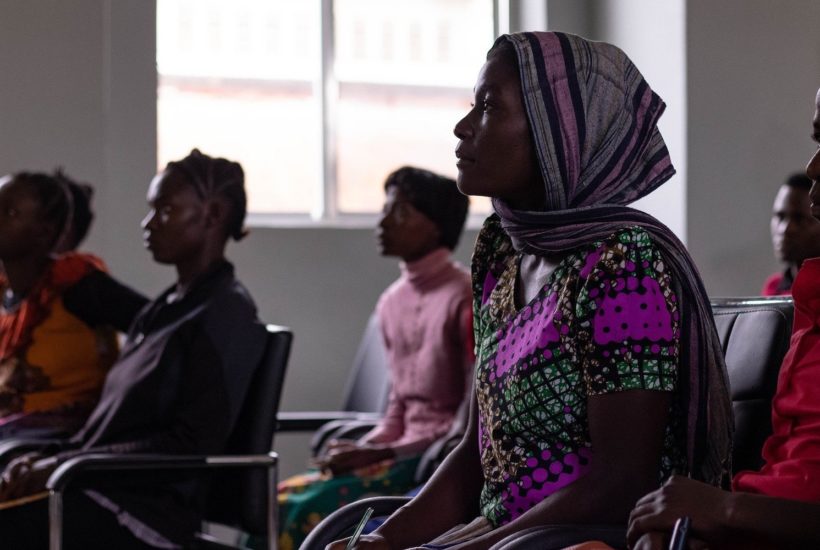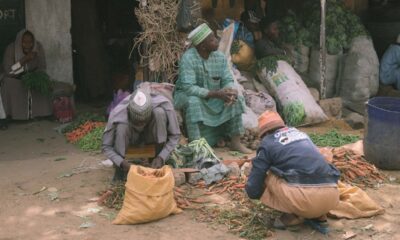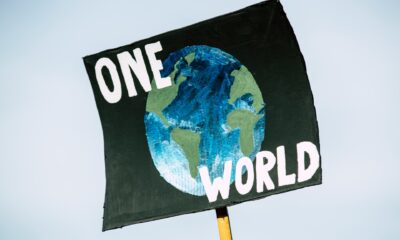Africa
Burkina Faso launches National Fund for inclusive finance for low-income people
The President of Faso, Roch Marc Christian Kaboré, launched the National Fund for Inclusive Finance on Thursday, September 10th, 2020 in Ouagadougou. A fund implemented by the Permanent Secretariat for the Promotion of Microfinance to serve as the financial arm of the Project for the Promotion of Inclusive Finance for Access to Financial Services for Low-Income Populations in Burkina Faso.

The National Fund for Inclusive Finance (FONAFI), whose objective is to enable social strata excluded from the conventional financial system to have access to basic financial services to increase their income, is to be implemented for four years. Indeed, starting in 2019, with the important 2019-2021 stage of the National Strategy for Inclusive Finance (SNFI), the implementation of FONAFI extends to 2023 and plans to reach approximately 1,032,000 people, 60% of whom will be women.
According to the Minister of the Economy, Finance and Development, Lassané Kaboré, FONAFI marks the operationalization of the Project for the Promotion of Inclusive Finance for Access to Financial Services for Low-Income Populations in Burkina Faso (PPFIB), which is a project worth about $80 million (44 billion FCFA). The main targets are women in rural and semi-urban areas, groups of farmers, fattening herders, small traders, micro and very small enterprises in urban and rural areas, and manufacturers and processors of local products.
The Minister added that, in the long term, the project aims to strengthen the capacities of the Decentralized Financial Systems (DFS) and facilitate their refinancing by banks, reach 1,032,000 beneficiaries, train 500,000 beneficiaries in financial education, and create and consolidate 7,500 micro and very small enterprises that will generate about 20,000 jobs.
The President of Faso, Roch Marc Christian Kaboré, said that FONAFI will contribute to achieving the overall objective of the National Strategy for Inclusive Finance, which is “to increase to 75% by 2023 the proportion of the adult population of Burkina Faso with access to and use of affordable and adapted financial products and services.”
Read the most important economic news in the world and find more about the newly launched National Fund for inclusive finance in Burkina Faso with the Born2invest mobile app.
FONAFI uses MFIs to reach its target populations
According to the Permanent Secretary of Microfinance, Wango Fidèle Yaméogo, the “faire-faire” strategy will be used in the implementation of the PPFIB. He explained that it is a direct support from FONAFI to microfinance structures in order to reach the beneficiaries. The objective, according to him, is to promote access to financing under very flexible conditions, such as the reduction of interest rates on loans.
At the level of financial institutions as a whole, he emphasized, institutions lend at rates of around 18% or even 24%, which are quite high for certain categories of the population. “With the WADB, the State has agreed with partner microfinance structures to reduce these rates to around 8 to 9%” he informed. He also said that in addition to the national financing funds, the partnership is concluded with sixteen microfinance institutions.
During the launch of FONAFI, about eight microfinance structures have received checks ranging from $271,200 (150 million FCFA) to $1.8 million (1 billion CFAF). Microfinance FINEC SA, which covers the entire national territory, received the largest check of $1.8 million (1 billion FCFA). According to its Chairman of the Board of Directors, Rigobert Ouédraogo, beneficiaries must propose controlled and understandable projects and agree to receive the necessary support to ensure that the resources are used appropriately. “We will apply zero tolerance in terms of reimbursement,” he said.
Burkina Faso’s financial sector, although strong, has not yet been able to fill the need
According to the President of the Professional Association of Banks and Financial Institutions of Burkina (APBEF-BF), Martial Goeh Akue, the financial sector in Burkina is currently dynamic, resilient and wealth-creating. The banking sector is composed of 19 credit institutions with 321 branches and 565 ATMs, the microfinance sector is composed of 134 SFD and supports about 1.5 million people in Burkina Faso. These sectors are complementary, he said, since banks refinance the microfinance sector.
This is why, he insisted, the establishment of FONAFI makes it possible to create synergy for the financing of the economy as a whole. The rate of bancarization in the broadest sense and the rate of access to financial services, which were 15% and 13% respectively in 2010, rose from 49% and 38% between 2017 and 2018.
However, the need is far from being met. For the president of APBEF-BF, Martial Goeh Akue, at the macroeconomic level the financing of large companies is very easy. That of SMEs has started to take off better at the regional level. On the other hand, at the microeconomic level there is still a gap to fill. This gap needs to be filled by a financial sector that includes banks, SFDs, national funds and all financial technologies.
“FONAFI appears today as a catalyst for economic development. This is why the banking sector is committed to supporting FONAFI. Support that does not stop at financing or refinancing but extends to the strategic plan,” concludes Martial Goeh Akue.
__
(Featured image by erinbetzk via Pixabay)
DISCLAIMER: This article was written by a third party contributor and does not reflect the opinion of Born2Invest, its management, staff or its associates. Please review our disclaimer for more information.
This article may include forward-looking statements. These forward-looking statements generally are identified by the words “believe,” “project,” “estimate,” “become,” “plan,” “will,” and similar expressions. These forward-looking statements involve known and unknown risks as well as uncertainties, including those discussed in the following cautionary statements and elsewhere in this article and on this site. Although the Company may believe that its expectations are based on reasonable assumptions, the actual results that the Company may achieve may differ materially from any forward-looking statements, which reflect the opinions of the management of the Company only as of the date hereof. Additionally, please make sure to read these important disclosures.
First published in lefaso.net, a third-party contributor translated and adapted the article from the original. In case of discrepancy, the original will prevail.
Although we made reasonable efforts to provide accurate translations, some parts may be incorrect. Born2Invest assumes no responsibility for errors, omissions or ambiguities in the translations provided on this website. Any person or entity relying on translated content does so at their own risk. Born2Invest is not responsible for losses caused by such reliance on the accuracy or reliability of translated information. If you wish to report an error or inaccuracy in the translation, we encourage you to contact us.

-

 Cannabis1 week ago
Cannabis1 week agoAurora Cannabis Beats Expectations but Faces Short-Term Challenges
-

 Crowdfunding5 days ago
Crowdfunding5 days agoSavwa Wins Global Design Awards and Launches Water-Saving Carafe on Kickstarter
-

 Biotech2 weeks ago
Biotech2 weeks agoAsebio 2024: Driving Biotechnology as a Pillar of Spain and Europe’s Strategic Future
-

 Business12 hours ago
Business12 hours agoDow Jones Nears New High as Historic Signals Flash Caution
























